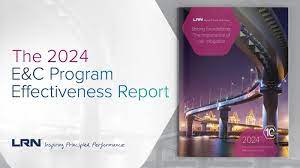LRN 2024 Program Effectiveness Report Underscores Importance of Values, Adaptation and Accountability

LRN continues to set the standard for ethics and compliance program research. Volkov Law is a supporter of, and advocate for, LRN’s research because it has consistently confirmed what we all know and believe — ethical companies perform better in the marketplace over the long run. It is an intuitive fact that employees respond better to values-based leadership than a rules-based environment and culture. Volkov Law is committed to that mission with our clients, colleagues, partners, and thought leadership.
LRN’s latest report was based on a survey of more than 1,400 ethics and compliance professionals, most of whom were employed at organizations with at least 1000 employees in 19 different countries and 26 industries across North America, Europe and Asia-pacific.
Interestingly, as compliance program mature, organizations are focusing on mitigating risks posed by complex government regulations, information security and AI, and data protection, while reducing attention to anti-corruption and anti-bribery issues. At the same time, companies are making significant changes to their respective ethics and compliance programs to reflect the working place needs of remote and hybrid employees.
For 2024 priorities, the LRN Report noted the following top five priorities: (1) Training content; (2) Measuring ethical culture; (3) improving web-based compliance resources; (4) internal controls; and (5) audit and compliance monitoring plans. Tellingly, the LRN Report data revealed that most companies have devoted attention to meeting detailed regulatory requirements and guidance on effective ethics and compliance program requirements.

Additionally, respondents cited the following five sources of information as useful for evaluating their compliance program and identifying areas for improvement: (1) misconduct trends and patterns; (2) risk analysis; (3) root cause analysis date for compliance lapses; (4) code of conduct and policy “clicks” on specific topics; and (5) surveys of ethical culture.
The LRN Report further identified the importance of senior management engagement in the operationalization of risk mitigation controls and company values. Fifty-two percent of respondents confirmed that senior executives dedicated more than words but actual actions to fulfilling their ethics and compliance responsibilities. As an important indicator of commitment to ethics and compliance, the LRN Report noted that 53 percent of respondents disciplined or terminated a senior executive for unethical conduct in the past year. Additionally, 73 percent of ethical organizations have defined clawback programs to deter senior executive misconduct.
The LRN Report noted some other interesting findings:
- Nearly two-thirds (63%) stated that their boards actively ensured that misconduct by senior executives and/or excellent performers was addressed.
- Almost 80 percent of ethics and compliance professionals stated that their organization relies on values rather than rules to ensure ethical behavior, a 26 percent increase from LRN’s 2016 Report.
- Four out of five high-performing programs noted that their board engaged in ethics and compliance program oversight, maintained ethics and compliance expertise and received ethics and compliance training.
- Just under 40 percent noted that they have strengthened risk controls in the areas of sanctions and export controls, down from 45 percent just two years ago despite the increased focus on the sanctions and export controls enforcement and compliance issues.

LRN’s Report is another important reminder that the link between ethical culture and business performance. A critical cornerstone of a company’s financial performance reflects the link between its ethical culture and its business operations. Both reinforce the other and promote a synergy that is essential for every organization.















